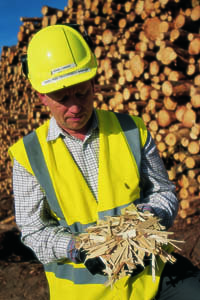

UK: The European Union’s Timber Regulation comes into force on the 3rd March 2013 for Importers, manufacturers and distributors and will prohibit the placing on the market for the first time in the European Economic Area (EEA) of illegally harvested timber and / or products by Operators. It also lays down obligations for Traders who subsequently sell or provide products thereafter.
According to the EUTR all Operators have to carry out a Due Diligence risk assessment on the wood or wood product they intend to place on the EEA market to demonstrate the wood or wood product they are providing is not illegal. An Operator is anyone who first places a wood product in the EEA, this could be an Importer, a distributor who buys directly from outside the EEA, a manufacturer within the EEA where the timber comes from outside the EEA, a forest owner within the EEA, a harvesting company within the EEA, saw mill within the EEA, etc. Moreover the UK and Ireland, in terms of carrying out Due Diligence assessments are classified as low risk because of very good system to ensure the legality of all wood placed on the EEA market i.e. felling licences and forest management plans. This is all taken into account during FSC certification and such licenses and plans will also provide information on country of origin and species of the woods used ensuring that no high risk wood is felled.
In the UK and Ireland wood based panel manufacturers are Traders which means they buy their raw material from Operators who have already carried out the Due Diligence Risk Assessments, plus the fact that all UK and Irish wood used for OSB is sourced from the UK and Ireland, adds up to UK and Irish OSB being easily classed as low risk with no worries regarding their provenance. In addition a distributor (ie. a Trader) buying from a UK or Irish OSB manufacturer has no more legal obligations than to know who he bought the OSB from and to whom he sold it (Traders only). This should already be covered by invoicing, and therefore be easy.
The new law will include penalties such as fines, stock being seized and their right to trade as a business suspended. As such any Operator placing wood based panels on the market will have to be sure about the legality of the products they buy. This could make some products such as mixed tropical hardwood plywood very complex to verify as low risk.
Alastair Kerr, director general for the Wood Panel Industries Federation and spokesperson for the JOSB Done campaign, which promotes the use of FSC accredited Oriented Strand Board, explains how companies can prepare for the ruling in advance to avoid costly mistakes next year:
“The best way to avoid getting into hot water when the new law is enforced in March, is to start purchasing compliant materials now.
“Products like Oriented Strand Board (OSB) made in the UK and Ireland have been FSC certified for many years and can therefore be regarded as coming from fully traceable, low risk wood sources.
“While there are still some builders that believe OSB isn’t up to the job of their usual ply, the majority of merchants and trade professionals rely on its defect free appearance and inherent strength for a wide variety of applications from structural applications such as timber framed housing sheathing, flooring or to general building tasks.
“With products like OSB readily available in leading timber merchants throughout the UK, industry leaders are advising that making the switch to compliant timber and wood panel materials now, will prevent any expensive mishaps once the 3rd of March is upon us.”
The JOSB Done campaign is supported by the WPIF, manufacturers Norbord and SmartPly and resin supplier Huntsman. For more information on OSB, visit www.JOSBdone.com